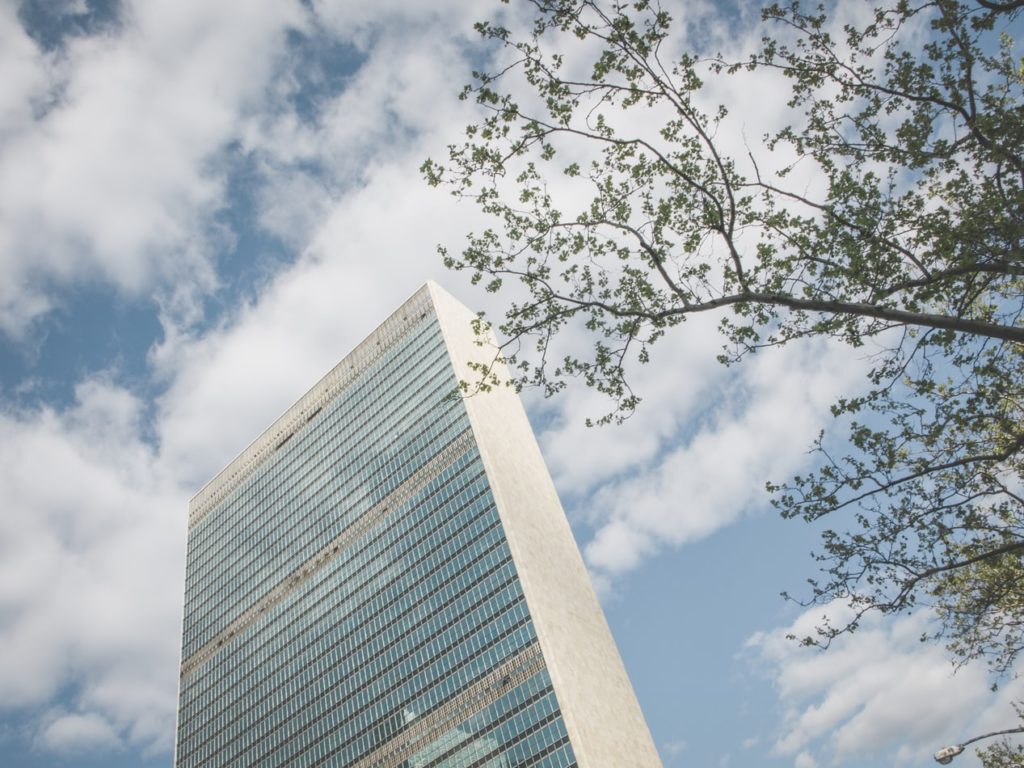The event featured remarks, on behalf of the roundtable’s co-sponsoring institutions, by the Deputy Permanent Representatives to the United Nations of Japan (H.E. Amb. Toshiya Hoshino), Qatar (H.E. Mr. Jassim Al-Maawda), and Nigeria (H.E. Amb. Samson Itegboje), and the Deputy Head of Delegation of the European Union to the United Nations (H.E. Amb. Joanne Adamson). Ms. Michèle Griffin, Senior Policy Advisor to UN Secretary General António Guterres, served as the program’s discussant, and the event was also co-sponsored by the UN Secretariat’s Human Security Unit.
With presentations by Dr. Richard Ponzio, Director of the Stimson Center’s Just Security 2020 Program, Dr. William Durch, Distinguished Fellow in the Just Security 2020 Program, and Dr. Joris Larik, Assistant Professor of International Law at Leiden University and Senior Researcher in the Just Security 2020 Program, the program was held in connection with the recently released book: Just Security in an Undergoverned World (Oxford University Press), the companion volume to the Albright-Gambari Commission Report.
The roundtable discussion provided an opportunity to explore how the new “Just Security” framework can serve as a bridge between human security and national and global security to achieve the 2030 Sustainable Development Goals, which aims to “leave no one behind” through innovative and proactive multi-stakeholder collaboration. The just security framework also seeks to contribute to the renewal, innovation, and reform of multilateralism as the United Nations approaches its 75th anniversary commemoration in 2020.
Other major takeaways from the event included:
- We need to enhance multilateralism and a rules-based global order to better people’s lives and encourage wider engagement in global governance. In this spirit, the new concept of “just security” can help, as achieving it entails forging a mutually supportive network of good democratic governance and sustainable peace globally, stressing the interdependence of security and justice.
- Good and inclusive governance is needed urgently to steer social systems towards their national development goals and should engage the talents and ideas of diverse governmental and non-governmental (including business and civil society) sector actors.
- A strategy for reform is necessary to ensure that the expected September 2020 summer innovates and strengthens today’s global institutions, laws, norms, and associated actors of global governance.
- Participants discussed the need to connect diverse issues and actors from the peace and security space with development, human rights, and environmental challenges. operationalizing new norms and institutions of global governance remains a formidable challenge within and across these challenging sectors.
- In an era of a great distrust worldwide in the international system of governance, we need to properly understand both the strengths and limitations of today’s global institutions in responding to global threats and challenges. To resurrect the idea of global collective action, the UN must urgently adapt and be reformed both from within and with the support and creative ideas of outside actors. Our problems are now shared across borders at a level unprecedented in history.
Several participants underscored the United Nations unique convening power, while stressing the need to connect who the UN is convening with effective global collective action. In an age of rapid technological innovation and life altering changes in science and medicine, we need to encourage the use of technology for the promotion of essential global public goods. Moving forward, participants stressed the importance of the just security framework having both a normative and conceptual impact; in order to operationalize just security, more thought should be given to the prioritization and sequencing of interventions that adhere to the concept’s fundamental principles.

